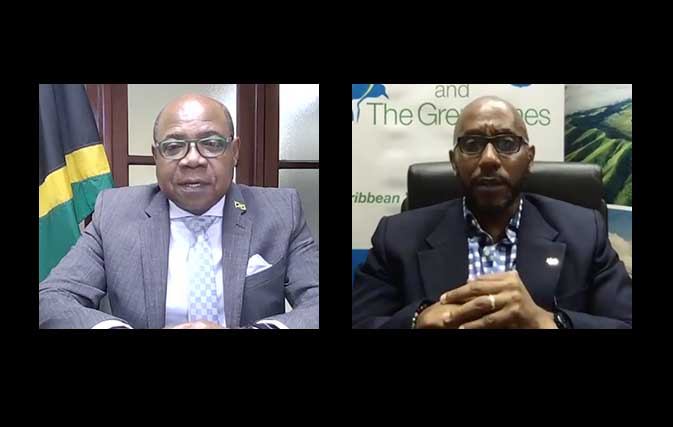TORONTO — A possible “air bridge” between Jamaica and Canada is currently being discussed that could see the easing of safety protocols specifically for Canadians.
During a Facebook Live update on June 30 hosted by the Caribbean Tourism Organization, Jamaica’s Minister of Tourism, Edmund Bartlett, noted Canada’s “high-level” response to the COVID-19 pandemic and suggested that an air bridge would allow for less rigid measures for incoming Canadian visitors.
But Bartlett also noted that the government of Canada is still advising against all non-essential travel.
“The Canadian market is driven a lot more by Canada than us,” he said. “Canada is still not open for international tourism the same way the United States is.”
In the first two weeks after reopening to international tourists on June 15, Jamaica welcomed over 6,000 visitors, the majority of whom arrived from the U.S. With all travellers to Jamaica required to take a swab test for COVID-19 upon arrival, only 15 of the initial 6,000 visitors tested positive for the virus. Most of these, said Bartlett, came from high-risk states in the United States including New York, Florida, Arizona and Texas.
But banning Americans entirely from entering the country is out of the question, he said.
“The U.S. is our livelihood, making up 50% of our market, up to 70% if you add cruisers. We don’t have the same luxury as Europe to ban Americans outright, so we have to manage as best we can in order to stay alive,” he said.
Currently, July is looking strong for Jamaica, with up to 20 flights per day coming into the island including Air Canada service to Kingston and Montego Bay. During phase one of its reopening plans, a ‘COVID-19 Resilient Corridor’ was established between Negril and Port Antonio where many hotels have been deemed safe for travellers.
During phase 2, the start date of which will be determined at a government meeting scheduled for around July 15, more hotels and resorts will reopen with strict safety protocols in place. Bartlett added that the government is also looking into insurance coverage that would help cover the costs of testing and quarantines.
Attractions and local entertainment in Jamaica remain closed for now. Bartlett said the country is “not ready yet” to accommodate pre-COVID-19 visitor numbers, but that it’s in a “good position to have a reasonable summer.” By November, he expects to see “some level of activity”, with tourism back on track for 2021.
“We have to manage things carefully and open responsibly,” he added. “We’re doing very well with everything and are mindful of not undoing all the good work that’s been done so far.”
The Facebook Live session also gave Bartlett the chance to share some advice with Glen Beache, Chief Executive Officer of the St. Vincent and the Grenadines Tourism Authority. “Have good, robust protocols in place and make sure there’s compliance across the board. Compliance is everything,” Bartlett advised.
Beache, who in turn commended Bartlett and Jamaica for their handling of the pandemic, confirmed that St. Vincent and the Grenadines kicked off phase 1 of its reopening plan yesterday, July 1. And though the island never officially closed its borders during the pandemic, “if everyone around you is closed then you are also, so to speak,” said Beache.
During phase 1, which is expected to last the entire month of July, all travellers arriving in St. Vincent of the Grenadines will be required to take a PCR COVID-19 test upon arrival at a cost of US$40 for non-nationals. They will then await the results, which will take approximately 24 hours, at their designated hotel.
For travellers who achieved a negative result within 72 hours prior to arrival in St. Vincent and the Grenadines, they will not be required to be tested again upon arrival and will be granted entry. Travellers who test negative for COVID-19 will not be required to quarantine; those who test positive will be sent to quarantine immediately for 14 days.
Phase 2 is expected to commence on Aug. 1 (though this date is subject to change) with a possible “bubble” with other Caribbean islands. Residents within this bubble would not be required to undergo testing.
When asked if there are concerns over a potential outbreak once the destination fully reopens, Beache said everyone must accept the fact that there will be new cases.
“Even if you have no active cases, you can’t say you’re COVID-free – the only way to be COVID-free is if you test everyone,” he said. “Once you open up borders, there’s going to be a strong chance that you’ll get another case. This is why we must have testing on point.”
Beache also noted that St. Vincent and the Grenadines doesn’t have daily flights like Jamaica, which would limit the risk to a certain point. Air Canada is expected to resume service from Toronto on July 23, while American Airlines will resume on July 11 with a full flight from Miami.
“It’s a matter of finding the right balance – every island needs to find what’s right for them, based on the size of their product,” he said. “Finding that balance is very important while at the same time doing everything we can to remain safe.”
For more information about Jamaica and St. Vincent and the Grenadines go to:
https://www.visitjamaica.com/canada/

